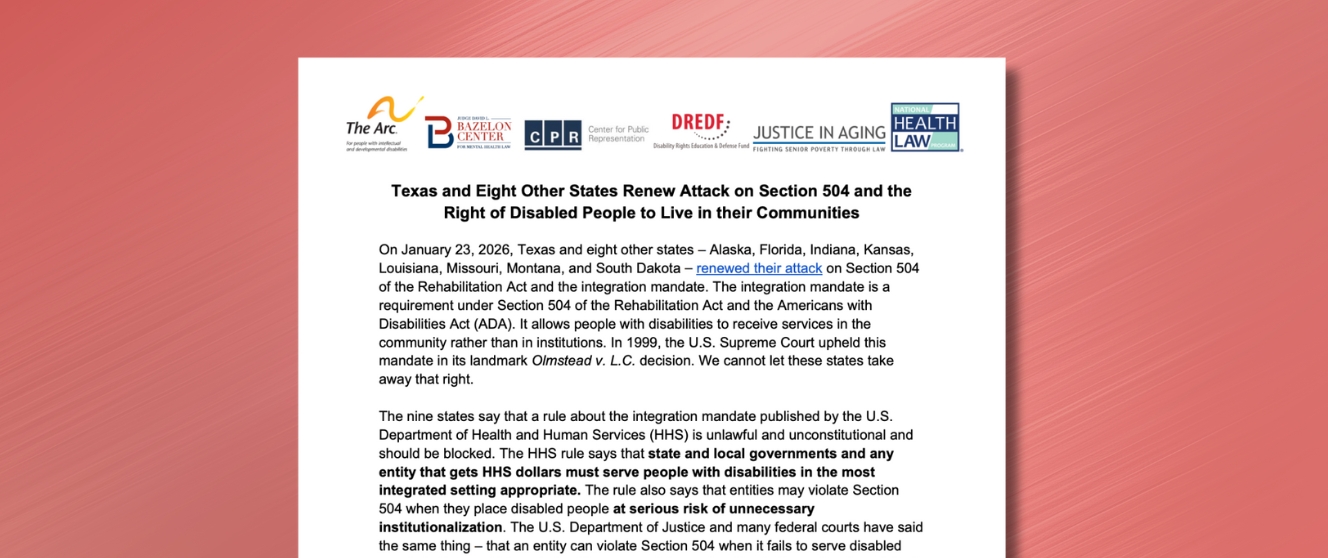
FOR IMMEDIATE RELEASE:
March 29, 2018
Sacramento, California — The California Senate is considering a bill introduced by Senator Nancy Skinner, SB 1190—The Sterilization Compensation Bill—to provide victim compensation to survivors of California state-sponsored sterilization between 1909 and 1979. The bill, which is co-sponsored by California Latinas for Reproductive Justice (CLRJ) and the Disability Rights Education & Defense Fund (DREDF), would make California the third state in the nation to provide compensation for survivors who were sterilized under state eugenics laws.
The number of people sterilized under the 1909 eugenics law in California account for one third of all the recorded sterilizations that occurred in the United States in the 20th century. All people affected lived in state institutions and were classified as having disabilities or deemed “unfit for reproduction.” Administrators of the law at the time had broad discretion in practice to decide who was classified as “unfit.” The majority of sterilizations were done on women and girls, and disproportionately impacted Latinas, who were 59% more likely to be sterilized than non-Latinas.
The sterilizations continued until the law was repealed in 1979. At the Sonoma State Home, which sterilized more than 5,000 people, approximately 25% of those sterilized were “sent for sterilization only.”
“The legacy of California’s eugenics laws is well-known and their repercussion continues to be felt,” said Laura Jimenez, Executive Director, California Latinas for Reproductive Justice, or CLRJ. “As reproductive justice advocates, we recognize the insidious impact state-sponsored policies have on the dignity and rights of poor women of color who are often stripped of their ability to form the families they want. This bill is a step in the right direction in remedying the violence inflicted on these survivors.”
“For 70 years, it was legal for Californians to be sterilized just because they were disabled or somebody thought they were disabled. California’s Sterilization Compensation Bill helps provide redress to disabled survivors who were wrongly sterilized against their will,” said Susan Henderson, Executive Director, DREDF. “Taking responsibility for this injustice is the necessary next step to guard against future state-sanctioned abuse and discrimination.”
Eugenic sterilization programs are now considered a major human rights abuse. California officials apologized for this historical wrong in 2003. California’s history of sterilization malfeasance includes the non-consensual tubal ligations of Mexican-origin women at USC/LA County Hospital in the 1960s-1970s, and 150 unauthorized operations performed on female inmates in state prisons from 2006-2010.
This bill would help compensate verified survivors of California’s eugenic sterilization program, establish markers at designated sites that acknowledge the compulsory sterilization of thousands of people in the state, and develop a traveling historical exhibit and other educational opportunities about eugenics laws and the far-reaching impact they had on California residents.
“For 70 years California sterilized individuals the State deemed unfit to have children,” said Senator Skinner. “With this program, we can shed light on something that should never have happened, and offer some small solace to the people affected.”
Although monetary compensation cannot adequately address the harm suffered by sterilization survivors, it is a material acknowledgement of this wrong.
###
About California Latinas for Reproductive Justice (CLRJ)
CLRJ is a statewide organization committed to honoring the experiences of Latinas to uphold our dignity, our bodies, sexuality, and families. We build Latinas’ power and cultivate leadership through community education, policy advocacy, and community informed research to achieve Reproductive Justice. Learn more about California Latinas for Reproductive Justice.
About Disability Rights Education & Defense Fund (DREDF)
The Disability Rights Education and Defense Fund (DREDF), founded in 1979, is a leading national civil rights law and policy center directed by individuals with disabilities and parents who have children with disabilities. DREDF works to advance the civil and human rights of people with disabilities through legal advocacy, training, education, and public policy and legislative development. Learn more about DREDF.
CONTACT: Susy Chávez, Director of Communications
California Latinas for Reproductive Justice
Email: susy@clrj.org
O: 213.270.5258 C: 323.534.9290
CONTACT: Lawrence Carter-Long
Disability Rights Education & Defense Fund
Email: LCarterLong@dredf.org
T: 510-644-2555 x5256

